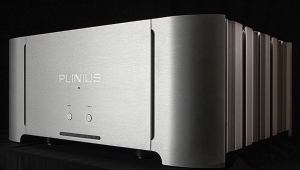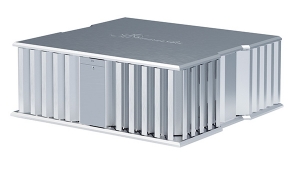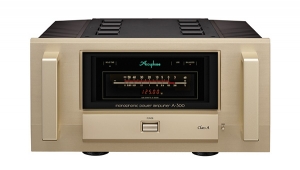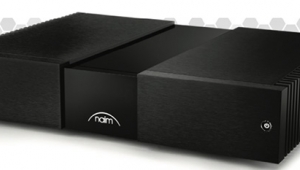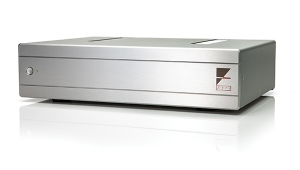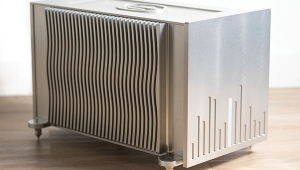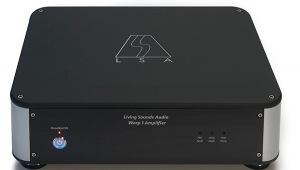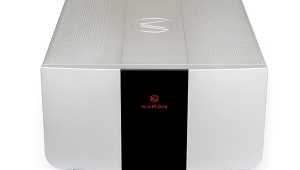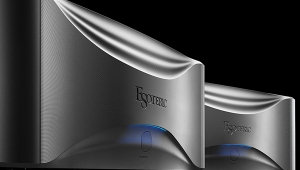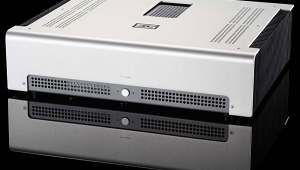| Columns Retired Columns & Blogs |
YBA Passion 1000 monoblock power amplifier
Without passion man is a mere latent force and possibility, like the flint which awaits the shock of the iron before it can give forth its spark.—Henri-Frédéric Amiel
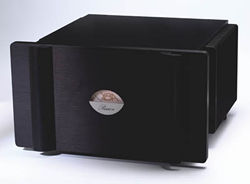 Although French amplifier manufacturer YBA is known for its "only as big as it needs to be" design philosophy, founder Yves-Bernard André must have heard the call of the wild when he dreamed up these somewhat out-of-character superamp monoblocks. The Passion 1000 is relatively large—19" across its heavy faceplate, 19" deep (including the modest heatsinking at the rear)—and stands about 12" high on a trio of chunky round footers.
Although French amplifier manufacturer YBA is known for its "only as big as it needs to be" design philosophy, founder Yves-Bernard André must have heard the call of the wild when he dreamed up these somewhat out-of-character superamp monoblocks. The Passion 1000 is relatively large—19" across its heavy faceplate, 19" deep (including the modest heatsinking at the rear)—and stands about 12" high on a trio of chunky round footers.
The broad faceplate is handsome in a muscled-shoulders kind of way, and a Philip Starck-like winglet sprouts from either side of the ovoid, centrally placed level indicator. (These "meters" seemed largely out of touch with reality, so I toggled them off with a convenient switch.) Around back, the shallow heatsinking takes up about two-thirds of the rear panel, with room left over for two pairs of YBA binding posts for biwiring, each pair sporting a different damping factor. (The upper pair yield a value of 400 at 100Hz, and worked best into the JMlab Utopia speakers.) RCA and XLR inputs are provided; an IEC mains input and an On/Off toggle complete the picture.
The Passion 1000s weigh 143 lbs each and are built like the proverbial tank. Still, hunkered down near the floor in their all-black livery, they exuded an understated aura of style and class, the oval level indicators a tasteful blip of postmodern retrochic. They're very well proportioned, and seemed smaller than my senses told me they must be as we dragged them around our listening room (footnote 1). We schlepped them either side of the looming Forsell Statement dual-mono amplifier sitting high off the floor on its polished granite footers. As the Utopias sit only a bit farther outboard on the 10' by 4' MDF sheet that stiffens the floor, you can be sure I whacked the Passions a few glancing blows with my ankles as I passed. Ooo-la-la, that smarts.
I soon realized that the Passions were like unto a black hole, completely inert and nonresonant to a fare-thee-well. Tapping anywhere on them elicited only an extremely dull thonk and, inevitably, bruised knuckles. The bottom plate is fabricated of nonmagnetic steel, the rest of the chassis of either brushed aluminum or a polished and colored variety. I fear a lot of that concentrated weight is in the transformers, blessed be their name. (See accompanying Sidebar, "The YBA Power Transformers," for a few details of their construction.)
You don't just get kick-it-and-you-die build quality; the circuit itself is highly refined. The output transistors are mounted on solid copper blocks with no mica insulating wafers. This improves heat dissipation, of course, and reduces the effects of thermal distortion. The circuit is completely symmetrical and cancels any "irregularities" in the power supply, minimizing parasitic ground currents and eliminating the need for passive components in the signal path. The parts count is kept low too, the signal path containing only transistors and passive components soldered directly to one another. No wiring, no circuit boards.
The power supplies operate in what's called "Class Alpha." Yves-Bernard André: "The power supply works like a class-A design, but the output stage delivers only the power required by the music signal. Therefore, you have the advantages of class-A operation—linear output with current on demand—without the negatives. Therefore, our amplifiers run cool, which improves reliability and avoids thermal stress on the components and the resultant parasitic vibrations."
The input stage is described as complementary double differential followed by a pre-driver stage, which allows the "adaptation" of the impedance values and the initial amplification of voltage. This is followed by a third gain stage, which distributes the current and voltage to the output stage directly coupled to the loudspeakers. Yves-Bernard: "The bandwidth of the four stages is constructed so that it decreases from input to output, thereby ensuring the minimum distortion from transient modulation."
The output stage has no local feedback, and overall loop feedback is "very low" at —20dB. M. André: "In fact, since feedback can only correct existing faults, strong feedback overloads the input, which masks detail and creates an 'electronic' sound."
Sound
Passion, though a bad regulator, is a powerful spring.—Ralph Waldo Emerson
The Passion 1000s were powerful, suave performers. Of all the gear we've auditioned chez Scull, none has presented such a clean, controlled, fully developed, yet utterly transparent midbass as did the Passions, especially in the grip of YBA's own Signature 6 Chassis preamplifier. Yes, it's true—we've cleaned up the entire bass range in our listening room with a combination of Argent RoomLenses and ASC Studio Traps. But understand that the room treatments don't impose their own sonic signatures on the sound. Rather, they create an optimized acoustic environment in which various components can perform to the best of their collective ability. Given that, I've found it's not always a good thing when some aspect of a component's sound jumps out at me from the start. Components that speak quietly usually wield the biggest sticks. The Initially Startling have, from time to time, become the Eventually Fatiguing. Not so the Passions, I promise you. Instead, their truly extraordinary openness in the midbass seemed to open up the deep bass, liberating everything above it right to the very top!
YBA has fused this quick, lithe, transparent bass range to a lower, mid-, and upper midrange to die for (especially considering the solid-state nature of the beast), and highs that, though a soupçon laid-back, nevertheless were quite as detailed, sweet, and elegant as music has ever sounded to me. Add the breathtaking transparency of the amps to the utter and complete transparency of the Signature 6 Chassis, throw in a huge, airy soundstage replete with palpable, ever-so-corporeal imaging and world-class layering, and you've got a recipe for glorious sound.
Since I'm gushing, let me also mention that microdynamics—those little shifts in level that make the performance come alive—were in the Wonderful class, but overall the macrodynamics were a shade less sparkly and vivid than those managed by the Forsell or the Boulder 2050. (The Forsell is still our solid-state reference, but it's also twice the price of a pair of YBA monoblocks. And the Boulder? Four times the price!) Detail was extraordinary without ever sounding chopped up or hashy. The Passion 1000s presented music naturally—with elegance, beauty, and poise.
At the same time, under high-decibel assault their overt muscularity and bottom-end grip prevented any hint of bloat or wimpy, confused sound. When push came to shove, the Passions grunted it out with the best of them. Yet with that power came grace and pace; the amps always propelled the Utopias along at an enthusiastic clip, replete with joyous swing and sharp timing. Sorta sounds like I had it all, yes, no, isn't it so?
- Log in or register to post comments




